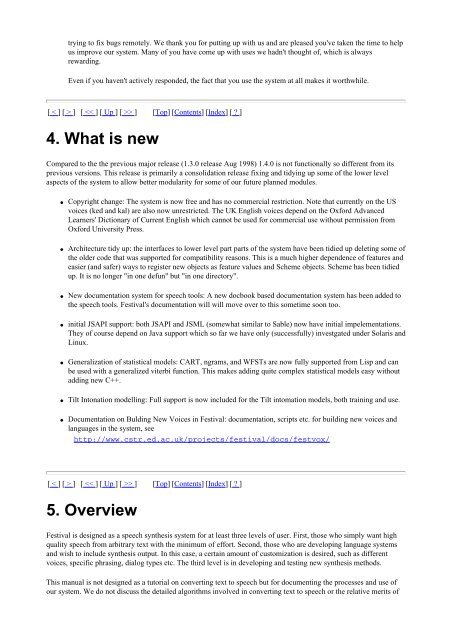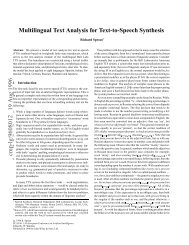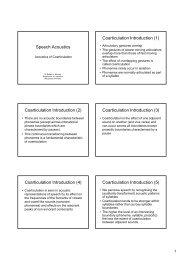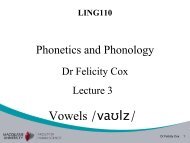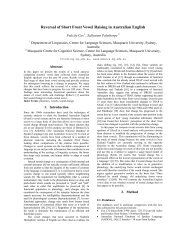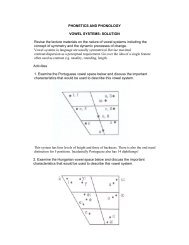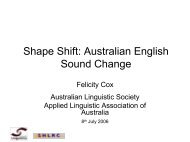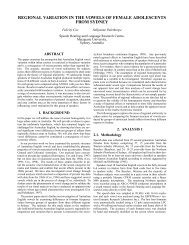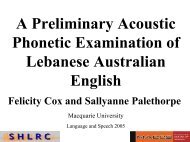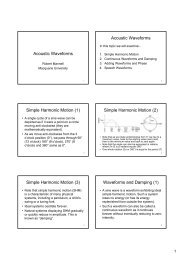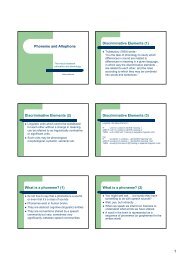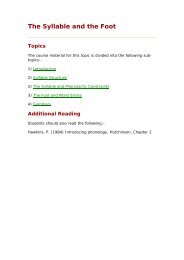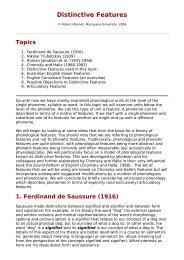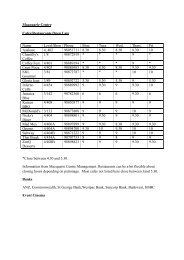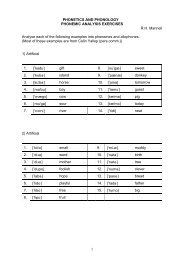Festival Speech Synthesis System: - Speech Resource Pages
Festival Speech Synthesis System: - Speech Resource Pages
Festival Speech Synthesis System: - Speech Resource Pages
You also want an ePaper? Increase the reach of your titles
YUMPU automatically turns print PDFs into web optimized ePapers that Google loves.
trying to fix bugs remotely. We thank you for putting up with us and are pleased you've taken the time to help<br />
us improve our system. Many of you have come up with uses we hadn't thought of, which is always<br />
rewarding.<br />
Even if you haven't actively responded, the fact that you use the system at all makes it worthwhile.<br />
[ < ] [ > ] [ > ] [Top] [Contents] [Index] [ ? ]<br />
4. What is new<br />
Compared to the the previous major release (1.3.0 release Aug 1998) 1.4.0 is not functionally so different from its<br />
previous versions. This release is primarily a consolidation release fixing and tidying up some of the lower level<br />
aspects of the system to allow better modularity for some of our future planned modules.<br />
● Copyright change: The system is now free and has no commercial restriction. Note that currently on the US<br />
voices (ked and kal) are also now unrestricted. The UK English voices depend on the Oxford Advanced<br />
Learners' Dictionary of Current English which cannot be used for commercial use without permission from<br />
Oxford University Press.<br />
● Architecture tidy up: the interfaces to lower level part parts of the system have been tidied up deleting some of<br />
the older code that was supported for compatibility reasons. This is a much higher dependence of features and<br />
easier (and safer) ways to register new objects as feature values and Scheme objects. Scheme has been tidied<br />
up. It is no longer "in one defun" but "in one directory".<br />
● New documentation system for speech tools: A new docbook based documentation system has been added to<br />
the speech tools. <strong>Festival</strong>'s documentation will will move over to this sometime soon too.<br />
● initial JSAPI support: both JSAPI and JSML (somewhat similar to Sable) now have initial impelementations.<br />
They of course depend on Java support which so far we have only (successfully) investgated under Solaris and<br />
Linux.<br />
● Generalization of statistical models: CART, ngrams, and WFSTs are now fully supported from Lisp and can<br />
be used with a generalized viterbi function. This makes adding quite complex statistical models easy without<br />
adding new C++.<br />
● Tilt Intonation modelling: Full support is now included for the Tilt intomation models, both training and use.<br />
● Documentation on Bulding New Voices in <strong>Festival</strong>: documentation, scripts etc. for building new voices and<br />
languages in the system, see<br />
http://www.cstr.ed.ac.uk/projects/festival/docs/festvox/<br />
[ < ] [ > ] [ > ] [Top] [Contents] [Index] [ ? ]<br />
5. Overview<br />
<strong>Festival</strong> is designed as a speech synthesis system for at least three levels of user. First, those who simply want high<br />
quality speech from arbitrary text with the minimum of effort. Second, those who are developing language systems<br />
and wish to include synthesis output. In this case, a certain amount of customization is desired, such as different<br />
voices, specific phrasing, dialog types etc. The third level is in developing and testing new synthesis methods.<br />
This manual is not designed as a tutorial on converting text to speech but for documenting the processes and use of<br />
our system. We do not discuss the detailed algorithms involved in converting text to speech or the relative merits of


